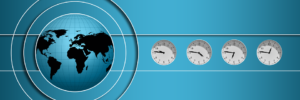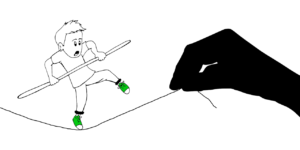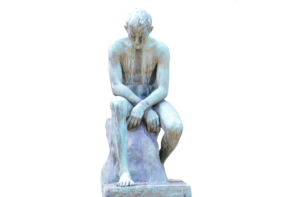The Zone of Happiness
This week as I traveled about, visiting the lives of others along the way both online and in-person, I was struck by a few things I’d like to share with you. Specifically, I want to talk about narrowing thinking and how it lies at the crux of the best of human experience.
When I think of those times in my life when I was firing on all cylinders, it’s when I’ve been able to focus at such a deep level my total being was engaged in living in the moment. It’s when the distractions of my surroundings are inconsequential to what’s before me. It’s when time seems stands still.
I’m not sure if you know what I mean, but if you think back, you’ll quickly remember a scene from your history where you were so engrossed in what you were doing that all else didn’t matter. I wonder if you realize it’s at these moments when we are at our happiest.
Let me qualify that statement. I surely don’t mean a form of bliss where we are like Snoopy just grooving to Schroeder’s piano. Though this is sometimes a part of it, it’s by no means the template against which we should judge our affective experience in these circumstances.
What I mean by happiest is more like we are blissfully unaware of feeling at all. At least, the tyranny of emotion is lost for the moment, and we leave behind all feelings of inadequacy. Our usual level of vigilance changes, but it’s not that we let our guard down. No. It’s because something else takes over.
That something is a feeling of almost limitless power, or better, power being expressed at the limits of our abilities. This is when we hit a zone, or our zone, and whether we hit it accidentally or on purpose doesn’t matter. What counts here is a condition which lies at the pinnacle of human expression. It’s as if we know it’s where we belong, a place where good things, sometimes great things, happen.
It’s a serious manifestation of our gifts coming together all at once, without being aware of limits or constraints which might cast doubt upon our competence. It’s more than confidence because it’s a blend of the mental and the physical, a symbiosis, the meaningful whole of an action. It’s the Gestalt.
Practice, Focus and the Impossible
The quick and easy way to hit zones is to practice over and over so new competence is ingrained in the cerebellum, like never forgetting to ride a bike once learned. Being able to shut out distractions is next, narrowing down focus to what is before you, so time is lived second by second, or not noticed at all.
When the first two conditions are met, the longer you linger there, the more chance you have of hitting the heretofore impossible. That’s when you stretch, using your powers of concentration and emotional equilibrium to push the boundaries of your skills. It’s a time when we truly get out of our own way, allowing whatever talent we have to sing fully, to express itself at its peak and beyond.
I’d sometimes get like this after a few years of shooting snooker. In my best games, I wouldn’t even notice my surroundings except for how they were needed to play the game. It didn’t matter who was watching, or what my opponent did. My eyes were on the green table cloth and the balls. My whole body and mind was an extension of the cue and cue ball and I could make that ball do my bidding without regard to limits. I’d control the game in a way far above my normal play.
I say the zone is also when we feel most alive. The connection between our existence and the world around us blends seamlessly, acting as one, without boundaries and without fear or need to explain. We are poetry in motion. We are the poet.
It’s as if we are nodding to the Universe, acknowledging its wisdom in choosing us, in bestowing a chance at life to this very being. It’s when we are fulfilling our promise, the pact we have with life itself.
Cheating the Zone
Sadly, I don’t think we get enough of it. And the peace and power derived from visiting our zone has such appeal that we often try to recreate its essence in other ways. Unfortunately, these are often maladaptive, poor substitutes for the real thing causing more harm than good. What lies at the heart of these coping mechanisms is the desire to narrow thinking, to thin out the complexities of life and simplify what occupies the mind.
Drink a few beers or haul on a joint and watch your thinking narrow accordingly. You’re in some kind of zone alright, but it’s not a celebration of your personal power. It’s a artificial hijacking of your sympathetic system, putting your physiology into a fear state to narrow your focus to escape danger. Whereas the real zone slows your heartbeat and focuses your power, this effect increases the heartrate and scatters your competence.
And it works—soon all your thinking of is pizza, or pussy, or fighting. Or you have slowed your body down, frozen, like a deer standing on the road staring at headlights. Or the rabbit you see on the neighbours lawn, immobilized, heart beating as fast as a snare drum, hoping it blends in.
For some, TV, food, porn, gambling, cigarettes, shopping all have the same capacity to narrow focus artificially, from an external view but without engaging the internal power and talent which exists in all of us. The suicidal try to do the same thing, narrowing their thinking down so effectively to escape the pain of life until, tragically, their options run out.
External vs Internal
The eyes see out, I like to say. So much of what we do is triggered by what the eyes can take in. Like all of our gifts, sometimes our qualities can become faults. Too often we see and respond without considering what we really seek. We all need to narrow our focus, to feel alive and celebrate our gifts in the moment. Too often we seek to do this by taking a pill of some kind, by relying on the environmental, the external solution to what really can only be solved internally.
You might expect I’ll speak now of finding more adaptive ways of narrowing thinking, of recognizing it’s draw as a fundamental expression, and encouraging you to make better choices. But here’s what I was taken with this week:
Turns out we don’t need 10,000 hours to become competent at something. See, the way I just wrote that represents the impression I took from reading Malcolm Gladwell’s famous missive about learning a new skill. It’s my own nonsense and represents the way I, along with most people I know, have misinterpreted the commitment he writes about. He’s talking about elite level mastery, world class level competence.
Old Dogs, New Tricks
In a TedX talk I watched this week, Josh Kaufman talks about researching Gladwell’s misunderstood recommendation and finding it takes around 20 hours to learn a new skill adequately. Of course, I thought when I watched him, I’ve learned plenty of things in less than 10,000 hours! Kaufman breaks it down further, suggesting just 45 minutes a day for about a month will do the trick. This is a refreshing antidote to the Gladwellian notion that it takes 5 years of hard slogging to achieve respectable competence at something.
I have 20 hours. 10,000? Not so much.
In just under an hour per day for a month, you could learn a reasonable amount about something or get good enough at something to then decide if you wanted to learn more! Piano enough to play Fur Elise, a language well enough to visit a foreign country, how to weld so you can make… anything. It just goes on.
Well, there are twelve months in a year, and how many in a lifetime? If average lifespan is 80 and we take just 50 of those years as potential months of learning, that’s 600 months of opportunity. Or 600 new skills we could potentially get good enough at in our lifetime.
Oh my, where have all my excuses gone now?
I was thinking about this when one of the guys in my men’s group told us a family friend killed himself on Tuesday. Booze was a big contributing factor. These are always tragic. People will say the suicidal was selfishly passing their pain on to the living. It’s possible. Though suicidal people who have lived through attempts tell us they thought they were doing everyone a favour. There are no good answers.
Fear Works: Just Not Well
Every day I run into folks who are affected by this scourge—attempting to narrow thinking by taking short cuts—using drugs and alcohol to kickstart adrenaline and cortisol in their system, not realizing that this IS their addiction. It’s not so much the booze or drugs, it’s these fear hormones which create an emotional state providing relief from the complexity of their existence. While in fear, your focus is on survival, a much simpler scope, aimed at satisfying much baser needs.
And food and porn and gambling all do the same thing to a degree, using intermittent reinforcement to distract and narrow focus, attempting to gain a reward by way of a shortcut. Our eyes see out. But it’s here where the maladaptive breaks down: it’s like a dog chasing its tail. We never quite catch up.
And we don’t grow. Confidence wanes further for there is no competence in these.
There are no new skills to be found in that box of donuts, the next six pack of booze, the next shopping spree at the mall or the hardware store, the next pack of smokes or cannabis dispensary. You could argue there are skills to learn from the next porn clip you watch but that really depends how long you’ve been watching, doesn’t it?
The Search
What if we all realized this is what we were trying to do: narrow thinking. It’s our natural way of shutting out all the noise. Done right, it’s escapism with benefits. And it represents the only true way of meeting the need to live fully engrossed in the moment.
All sorts of things are like this. Watch any teenager who has mastered a video game at a high level. They get into a zone and if there wasn’t a clock on the screen and levels, they’d make time stand still. Look at their eyes, and they never leave the monitor. A friend of mine use to fly fish with such concentration that rather than go ashore to take a piss, he’d let it go in his neoprene waders and rinse them out later.
Neither of these extremes will kill you. Some of the other ways we narrow thinking can and will. Yesterday I came home from a rather challenging week. Though I’m grateful to find myself alive every morning, I’m no more inured to the pain of life than anyone else.
Rather than go blow my mind with dope or booze, I instead sought ways to just calm myself and heal. Oh, I know there’s still pot kicking around here somewhere. And the beer store is a few blocks away. Heck, I could swallow a few Percocet, bumping up my occasional quarter tablet dosage to two or three full tabs and I’d be nodding in no time.
And these would have left me hung over this morning, feeling dissonance for having compromised my pact with nature, knowing I was ungrateful for the life I have been lucky enough to win. These would have eroded my confidence, which in turn, would affect my competence. This is the truth.
And that’s what meditation is for. No wonder it’s so popular. Even if you’re not a meditator, a walk will narrow thinking just as well. Perhaps I’m at an advantage because I have a slew of cognitive behavioural strategies I can implement to narrow my thinking. Well, these have come with practice. I also slept very well last night. I had to practice that too.
Come to think of it, I had to learn to drink in a dysfunctional way too. In fact, I worked hard at it over time, just as I did with the rest of it, from dope smoking to heroin use. Geez, it took me years just to learn how to roll a joint. Cocaine definitely took some getting used to—fed my paranoia. I puked my guts out first time I did heroin. All of these things took concentration and trial and error before I could successfully use them to… narrow focus. When measured up against all these, it’s actually easier to learn to narrow thinking internally, by far.
So try to think of those times when you entered into a zone of competence, and remember how good that felt.
These days, when things get to me and I feel like I need a break, knowing the secret, the real impetus of my condition, that what really begs my attention is just to narrow my focus, I have other choices.
And in a month, looks like I might just have one more.
You could too.
CHRISTOPHER K. WALLACE
Advisor to Men, Counsellor at Large
at ckwallace.com
©2018, all rights reserved
Kaufman’s TedX talk:



















